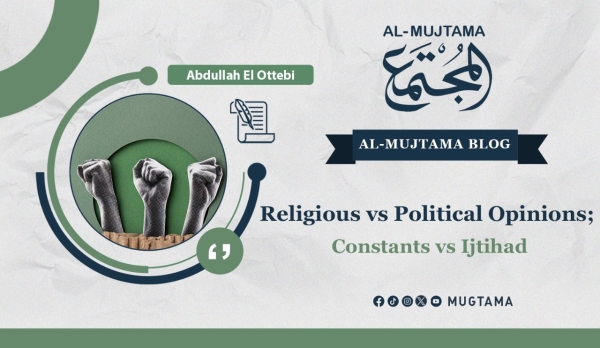Religious and Political Opinions: Constants vs Ijtihad
The question of how to distinguish between religious fatwas and political opinions often arises, especially when political views are expressed by religious figures. Some may confuse the two, assuming that every statement made by a scholar is a binding religious ruling, when in reality, it might be a political judgment subject to debate. One of the greatest historical examples illustrating the distinction between religious rulings and opinions open to discussion is what occurred during the Battle of Badr when the Prophet ﷺ chose the army's position, prompting a companion to inquire whether this choice was divinely revealed or merely a strategic decision.
The Battle of Badr: When the Companions Distinguished Between Revelation and Human Judgment
Upon reaching Badr, the Prophet ﷺ selected a location for the Muslim camp. However, Al-Hubab ibn Al-Mundhir (may Allah be pleased with him), an experienced military strategist, asked the Prophet ﷺ: "O Messenger of Allah, is this a position that Allah has commanded us to take, so that we must neither advance nor retreat from it? Or is it a matter of strategy, warfare, and planning?"
The Prophet ﷺ responded that it was his personal judgment and not divine revelation.
Al-Hubab ibn Al-Mundhir then said: "O Messenger of Allah, this is not the best location. Let us move to a position closer to the nearest water source of the enemy, settle there, block off the wells behind them, and construct a basin to fill with water so that we may drink while they cannot."
The Prophet ﷺ accepted his advice and implemented his plan, which became one of the reasons for victory at Badr.
The Importance of Distinguishing Between Religious Rulings and Political Opinions
This story highlights a fundamental principle: not everything issued by a religious figure is divine revelation or a binding ruling. The Prophet ﷺ, despite being divinely guided, distinguished between revealed law and personal judgment, and he accepted advice in matters of war and politics.
Had the army’s position been divinely commanded, there would have been no room for human judgment or discussion. But since it was a matter of strategy, it was open to modification based on expert opinion.
Applying This Concept to the Contemporary Context
Just as the Prophet ﷺ distinguished between revelation and strategy in warfare, today we must differentiate between:
- Fixed religious rulings based on definitive Quranic and Sunnah texts.
- Political opinions that are subject to analysis, benefit-harm considerations, and differing viewpoints among scholars and politicians.
How Can We Benefit from This Understanding?
1. Avoid assuming that every opinion from a religious scholar is a binding fatwa, as it may merely be a political analysis.
2. Distinguish between immutable religious matters, such as the prohibition of usury, and political issues subject to interpretation, such as positions on governments and groups.
3. Follow the approach of the Companions in questioning and verifying matters, as Al-Hubab ibn Al-Mundhir did when he asked the Prophet ﷺ, preventing confusion.
4. Recognize that politics is fluid and based on interests, whereas religious rulings are grounded in fixed divine texts.
The story of the Battle of Badr offers a profound lesson in distinguishing between fixed religious rulings and human judgment. Just as the Companions differentiated between revelation and strategic planning, we must also differentiate between religious commands and political opinions today, ensuring that religion is not misused for political ends or that political views are not given a religious authority that places them beyond criticism and debate.
-------------------------------------------------------------


